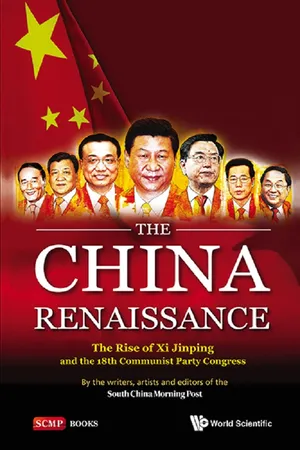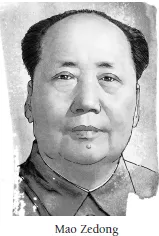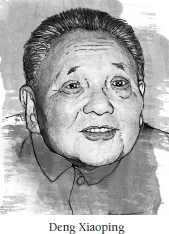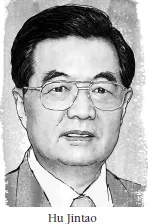![]()
From Strongman to
Consensus Rule
by Cary Huang
China’s Communist Party may have long since moved on from its violent legacy of bloody purges and ruthless power grabs that punctuated the early decades of the People’s Republic. But the level of intrigue and infighting that permeated the months leading up to and during the 18th Communist Party Congress in November 2012 showed that in China the transfer of power is just as contentious as ever. As a sign of the uncertainties bedevilling the handing over to the so-called fifth generation of Chinese leaders, not even the date of the congress of the world’s largest political party — in charge of the globe’s most populous nation and its second largest economy — was made public until a mere six weeks before the opening.
The era when China was effectively run according to dictates or whims of strongmen such as Mao Zedong and Deng Xiaoping has long since passed. Nowadays the Communist Party of China strives to project an image of “consensus-building” among a “collective leadership”.
However, whatever the effort to provide a smoothly scripted process, the bitter feuding that was clearly apparent in the run-up to the 18th party congress may well have been just as intense as any that occurred at previous such junctures, at least since the 1966–76 Cultural Revolution.
Tensions were bound to run high at the latest conclave, particularly as almost 60 percent of the 205 members of the Central Committee were being replaced, 14 of 25 members of the Politburo were relinquishing office and seven out of nine members of the inner sanctum of power, the Politburo Standing Committee, would retire. Only twice previously in the history of the Chinese Communist Party had so many leadership positions become available at the same time at a party congress.
Before the death of the last strongman, Deng, in 1997, decisions were taken by leaders within a very small circle, often indeed by a sole individual. The top figures, Mao before his death in 1976, and to a lesser extent Deng in the 1980s and 1990s, could more or less choose to stay in power until they died no matter what capacity they held, appoint anyone they favoured to any powerful position, and depose anyone whom they disliked or deemed incompetent.
In the post-1949 period, Mao loomed almost monolithically large, steering China through revolution and governance — often equally disastrously — implementing drastic land reforms, launching the Great Leap Forward that led to horrific famine, and unleashing the infamous Cultural Revolution.
During his reign, Mao ousted his anointed successor, Liu Shaoqi, after launching the Cultural Revolution. Liu died in squalor in prison. His second anointed successor, Lin Biao, died in a plane crash in 1971 after fleeing a failed court coup. Following the purge of the Gang of Four led by Mao’s widow Jiang Qing in 1976 and the rise of Deng, ruthless Communist Party power struggles continued in an almost forgotten chapter of China’s history.
In the post-Mao period, Deng heralded the “second revolution”, establishing his credentials as a reformer par excellence through reforms and open doors — de-collectivisation of agriculture, recognition of private entrepreneurship, creating Specialeconomic Zones and easing up on the micro-management of people’s everyday lives. Deng served as “paramount leader” — even without any formal party or state position — until his death.
Deng also wrested control of China from a thir d anointed Mao successor, Hua Guofeng, and then proceeded to depose his own two chosen protégés, Hu Yaobang and Zhao Ziyang, after both expressed sympathy with students demanding democracy. Zhao’s ousting came just prior to the bloody military crackdown on student-led demonstrations in Tiananmen Square on June 4, 1989.
Deng’s departure marked the end of an era of the one-man dominance, the most important change in the communist-ruled nation’s political landscape. In the post-Deng era, however, decisions to choose incoming leaders are all made behind closed doors in secret Communist Party gatherings. And any hint of uncertainty can spark an explosion of speculation, virtually ensuring that no leadership transition unfolds without drama.
And drama there was aplenty in the months preceding the 18th party congress, with the spectacular fall from grace of Communist Party aristocrat and Politburo member Bo Xilai, party chief in the huge Chongqing municipality.
Professor Steve Tsang, director of the University of Nottingham’s China Policy Institute, said the changes in the political arena since 1997 were meant to institutionalise the succession process and make it much more predictable and therefore stable, including long spells of apprenticeship for those earmarked for the top political and management posts.
“There has always been scope for balancing or horse trading for membership in the rest of the Politburo Standing Committee, but Bo’s efforts to force his way into the Standing Committee by his maverick approach in Chongqing changed the dynamics,” Tsang said.
Starting from the 1980s, Deng attempted to establish a set of rules to govern elite interactions and power succession. He re-institutionalised the party congress, and introduced age and term limits for leading government cadres. As time passed, some implicit and explicit rules seemed to have been established. In fact, rules such as age and term limits now effectively rule out the possibility of top leaders staying in power for too long, resulting in a much more predictable elite turnover. For instance, at the 16th party congress in 2002, the number four leader, Li Ruihuan, retired aged 68 after having served two terms. Since then, 67 has become the oldest age for anyone to start a new term in the Politburo and its elite Standing Committee. At the 17th party congress in 2007, all Politburo members aged 68 or above retired, and the same rule applied at the 18th party congress.
“The age limit has therefore greatly curbed the rise of charismatic leaders and figures with sultanistic tendencies. It is also now a critical criterion when the Party identifies future leaders,” said Zhengxu Wang, a senior fellow and deputy director of the University of Nottingham’s China Policy Institute. Thus the process to groom top leaders has been planned and prepared for years ahead. A number of promising leaders are identified early on and appointed to ministerial or provincial leadership positions in their early and mid-50s before they are eventually “elected” to become a member of the top decision-making Politburo and the Standing Committee.
For example, newly-promoted top leaders Xi Jinping and Li Keqiang were elevated to the Standing Committee at the 17th party congress in 2007 at the ages of 54 and 52, respectively.
Despite intense factional fighting to promote their members into top positions at the 18th party congress, no one would have doubted that Xi and Li had been assured of their top positions. Xi and Li were referred to as the incoming Xi–Li administration even before they were installed as number one and number two, respectively, at the conclave.
Before his death, Deng ruled there should be a core of the collective leadership in the Communist Party hierarchy. He said that Mao was the core of the first generation of leadership while he himself was that of the second generation. When Deng selected Jiang Zemin to succeed him as the core of the third generation, Jiang was at first regarded as a transitional leader, but amazed everyone when his protégés gained a majority in the Politburo and Standing Committee when he retired. While he was alive, Deng also picked Hu Jintao to succeed Jiang to become the core of the fourth-generation leadership.
The power handover from Jiang to Hu was a milestone in Chinese politics, since the change occurred without a major political crisis. It was an unprecedented peaceful transition of power.
However, the Jiang–Hu handover was pre-dictated by Deng. Nowadays, no figure has the same clout as Mao and Deng. So the Hu–Xi power transition was still the first test for a power transition without the presence of an all-powerful strongman.
Despite the intense internal fighting, the latest party congress did make progress in terms of institutionalising the power succession. It also featured for the first time overt campaigning more akin to American democracy than Chinese communism.
However, Cheng Li, of the John L. Thornton China Center at the Brookings Institution in Washington, said that like many other things happening in China, changes in the Chinese leadership were a paradox of hope and fear. “The growing pluralistic thinking in Chinese society and increasing diversity among politicalelites not only make consensus-building in the leadership very difficult, but also cause serious concerns about leadership unity and elite cohesion.” Indeed, the larger implications of the latest power transition suggested there was still little transparency or very small room for intra-party democracy. It also showed that the last major communist-ruled nation refused to accept any Western concept of democracy and constitutional rule, despite its devolving into a rule-by-consensus system.
![]()
The Hu–Wen Decade
Glorious, Golden and Lost
It was an era of glittering achievement for China under President Hu Jintao and Premier Wen Jiabao, so said the state media. But critics begged to differ, saying that despite the undoubted success stories, the country was subject to rising social, economic and environmental woes, plus growing mistrust between the people and government and lost opportunities for reform.
Stability but Stagnation
by Shi Jiangtao
In a bid to drown out discordant assessments of the previous decade, the party propaganda machine was at full throttle in the months prior to the 18th party congress, lavishing praise on China’s accomplishments under President Hu Jintao and Premier Wen Jiabao. It’s been 10 long, hard but glorious years, state media declared, a “Golden Decade” that saw the per capita gross domestic product soar to US$5,432 from US$1,135 in 2002 and the size of the Chinese economy grow to be the second largest in the world, behind only the United States.
Naturally, that’s how Hu wanted to be remembered, along with his two pet slogans — the “scientific concept of development” and “building a harmonious society” — enshrined in the party constitution. In one of his last key speeches in the run-up to the 18th party congress, Hu claimed victory over a “string of severe challenges” along “an extremely bumpy road” since becoming the party’s general secretary in November 2002.
While appearing anxious to secure his own legacy before he stepped down from the pinnacle of power, Hu was also aware that many people took such self-promotion, one of the trademarks of the self-perpetuating communist regime, with a pinch of salt. He sounded a note of caution in the speech, delivered to a group of senior central and local government cadres, many of them poised for key roles after the party congress.
“We are confronting unprecedented opportunities and we have to deal with unprecedented challenges in view of the current domestic and international situation,” Hu said. “We must not be afraid of any risks, or be confused by any distractions.” Hu also warned against the dangers of stagnation and ossification of thinking — terms that critics at home and abroad have used to describe Hu’s era and China.
While even his critics were impressed by the glittering economic success of the Hu–Wen decade, they disagreed with party apologists over who should be given credit for the nation’s increased prosperity. State media listed China’s economic strides amid the global downturn as the biggest achievement of the Hu administration. But several China specialists in the United States and Professor Zhu Lijia from the Chinese Academy of Governance said Hu and Wen mostly benefited from the efforts of their predecessors, including former president and party chief Jiang Zemin and former premier Zhu Rongji, whose bold reforms ushered in a period of rapid growth that culminated in the present economic miracle. “The accumulated effect of reform and opening up in the past two decades has helped the country’s economy onto the fast track and it doesn’t necessarily mean the current administration has done a better job than the previous one in terms of economic policies,” Professor Zhu said.
Professor Roderick MacFarquhar from Harvard University said one main contribution of Hu and Wen had been their attempt to “move away from helter-skelter investment in coastal provinces” and seek more balanced development, especially for central and western China. He said that was something that was neglected by the “catchphrase of the Deng-ist era ... some people will get rich before others”.
But analysts also said the “Golden Decade” hailed by state media was an overstatement, glossing over acute social, economic and environmental woes that had yet to be properly addressed, and inherent defects of one-party rule such as unbridled government power and secretive political manoeuvring. “This is the golden era of Chinese GDP growth and an explosion of productivity, and the era in which China, on aggregate, became a wealthy country,” said Professor Kerry Brown, a specialist in Chinese politics at the University of Sydney. “But it is also an era of deepening social and structural issues, of political stagnation, and of the failure to properly solve the problems of all-round growth.”
Professor Zhu warned that the authorities’ celebration of the golden era overlooked enormous dangers and challenges that could paralyse material prosperity overnight and plunge the country into a full-blown crisis. “It is more of a stagnant decade, if not a decade of retrogression,” he said. “The mistrust between the people and the government has reached boiling point, with public confidence in the authorities crumbling amid constant suppression of public opinion. Tough questions have been raised one after another in the past decade, but we have yet to see any of them sincerely addressed.”
Despite the rapid economic growth, an infrastructure boom in big cities and a string of populist policies aimed at improving people’s well-being, economist Mao Yushi said the authorities had failed to tackle difficult issues such as rebalancing growth and conservation in the controversial 4 trillion yuan economic stimulus package in 2008, or ending the state monopolies which posed a threat to China’s nascent market economy. “Apart from joining the World Trade Organisation in 2001 [which happened before Hu and...





